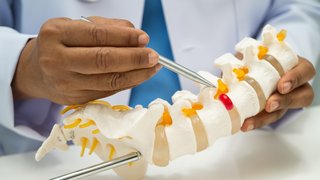The specialized spine doctors at UT Southwestern Spine Center are dedicated to helping patients overcome spine problems, providing comprehensive care and access to the latest and most effective treatments.
Endoscopic Spine Surgery
New Patient Appointment or 214-645-2225
MedBlog
Results: 5 Locations
Spine Center
at UT Southwestern Medical Center at Las Colinas 6121 N. State Highway 161, 3rd Floor, Suite 300Irving, Texas 75038 214-645-2225 Directions to Spine Center at UT Southwestern Medical Center at Las Colinas, Irving
Spine Center
at James W. Aston Ambulatory Care Center 5303 Harry Hines Blvd., 7th Floor, Suite 800Dallas, Texas 75390 214-645-2225 Directions to Spine Center at James W. Aston Ambulatory Care Center, Dallas Parking Info for Spine Center
Spine Center
at UT Southwestern Frisco 12500 Dallas Parkway, 3rd FloorFrisco, Texas 75033 469-604-9140 Directions to Spine Center at UT Southwestern Frisco, Frisco Parking Info for Spine Center
Spine Center
at UT Southwestern Medical Center at Richardson/Plano 3030 Waterview Parkway, 1st FloorRichardson, Texas 75080 972-669-7101 Directions to Spine Center at UT Southwestern Medical Center at Richardson/Plano, Richardson
UT Southwestern Neurosurgery and Spine Center at Texas Health Dallas
at Professional 3 8230 Walnut Hill Lane, Suite 204Dallas, Texas 75231 214-891-6590 Directions to UT Southwestern Neurosurgery and Spine Center at Texas Health Dallas at Professional 3, Dallas Parking Info for UT Southwestern Neurosurgery and Spine Center at Texas Health Dallas










